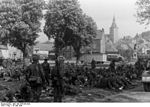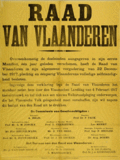Flamenpolitik (German: "Flemish policy") is a policy practiced by German authorities occupying Belgium during World War I and World War II. The ultimate...
5 KB (696 words) - 19:27, 12 April 2024
radical Flemish Movement by making numerous concessions as part of the Flamenpolitik in an attempt to gain support among the country's Flemish population...
34 KB (4,260 words) - 17:00, 22 October 2024
State University of Ghent, the University formed part of the German Flamenpolitik and was a response to the long-established grievance of the Flemish...
10 KB (1,088 words) - 17:04, 7 November 2024
Belgium as a means of facilitating its occupation, the Germans employed Flamenpolitik to divide the administration of Belgium between French and Dutch-speaking...
25 KB (2,370 words) - 07:48, 7 November 2024
easier to govern by exploiting the pre-war linguistic division. The Flamenpolitik ("Policy regarding the Flemish people") was launched in 1916. The occupying...
34 KB (3,182 words) - 22:03, 11 November 2024
favourable treatment of Flemish prisoners of war formed part of the Flamenpolitik (Flemish Policy) and had an explicit racialist foundation, since Nazi...
12 KB (1,364 words) - 09:12, 10 February 2024
Flanders and influenced by Nazi racial ideals, it adopted the so-called Flamenpolitik which gave preferential treatment to the Flemish population over the...
21 KB (2,654 words) - 08:54, 7 November 2024
Flanders from Belgium using German support provided as part of the Flamenpolitik. The Council originally included 46 members, but eventually expanded...
4 KB (463 words) - 11:29, 12 October 2024
of Warsaw Von Bissing University Raad van Vlaanderen (World War I) Flamenpolitik Thomas, N. (2003), The German Army in World War I, 1914-15 I, Osprey...
9 KB (521 words) - 04:22, 28 October 2024
created a large labour shortage in civilian occupations. As part of their Flamenpolitik, the Germans began repatriating Flemish prisoners of war in August 1940...
83 KB (9,340 words) - 10:06, 23 October 2024










